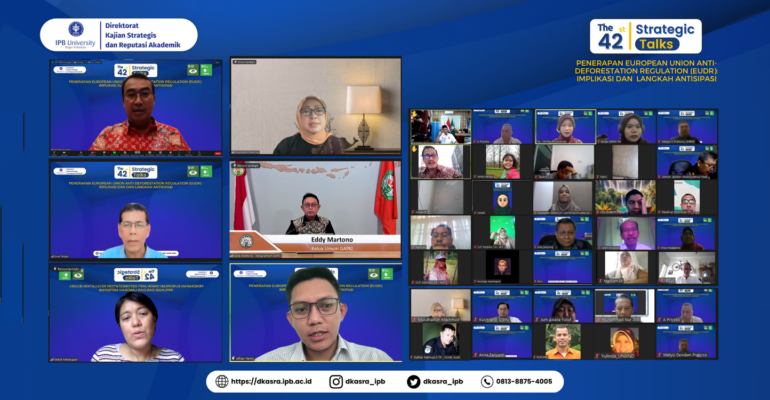IPB University Professor Reveals Indonesia’s Challenges in Facing EUDR Regulation

In 2023, the European Union passed an anti-deforestation regulation known as the European Union Deforestation Regulation (EUDR). This regulation will be enforced to ensure that commodities entering the European Union are not related to deforestation activities.
Indonesia, as a commodity exporter to the European Union, will be affected by this regulation, especially for smallholders. To study this, the Directorate of Strategic Studies and Academic Reputation (DKSRA) of IPB University organised The 42nd IPB Strategic Talks “Implementation of the European Union Anti-Deforestation Regulation: Implications and Anticipatory Steps”.
Prof Ernan Rustiadi as the Vice Rector for Research, Innovation and Agromaritime Development of IPB University said that the emergence of EUDR has caused various views and responses from various circles.
“Therefore, this forum is an opportunity to examine more deeply related to EUDR so that we are easier to determine our position and take anticipatory steps to respond to this policy,” said Prof Ernan on Tuesday, 13/1 online.
On this occasion, Prof Suria Darma Tarigan, Professor of the Faculty of Agriculture, IPB University explained some of the challenges faced by Indonesia from the EUDR.
“One of the challenges is the difference in the concept of forest area used in the EUDR and that in Indonesia. In the EUDR, the definition used is that of the Food and Agriculture Organization (FAO), while Indonesia uses the concept of forest from the Ministry of Forestry and Environment (MoEF), which has various categories of forest types,” Prof Suria said.
Dr Musdhalifah Machmud, Ministerial Expert Staff for Connectivity, Services Development, and Natural Resources, Coordinating Ministry for Economic Affairs conveyed five concerns of the government related to the EUDR.
“First, the government continues to encourage the European Union to develop a central database of deforestation risk assessment through a three-level country assessment system. Second, encouraging the inclusiveness of smallholders in the commodity supply chain. Third, improving certification schemes to comply with the EUDR. Fourth, Indonesia is developing a national dashboard to collect information on sustainable commodities. Fifth, is the protection of data privacy,” he explained.
Another resource person, Eddy Martono, Chairman of the Indonesian Palm Oil Association (GAPKI) explained about mitigation efforts that can be done to face the EUDR. According to Eddy, resolving the legality aspect of oil palm farmers’ plantations due to the existence of their plantations in forest areas is very important to do. “Without this legality, palm oil farmers’ products cannot enter the supply chain of export products to the European Union,” he added.
Meanwhile, Mardi Minangsari, President of Kaoem Telapak invited participants to see EUDR as an opportunity. “EUDR can help reduce deforestation and greenhouse gas emissions in Indonesia through its potential contribution in integrating sustainable palm oil trade initiatives into national climate change mitigation strategies,” she concluded. (IAAS/RUM)



